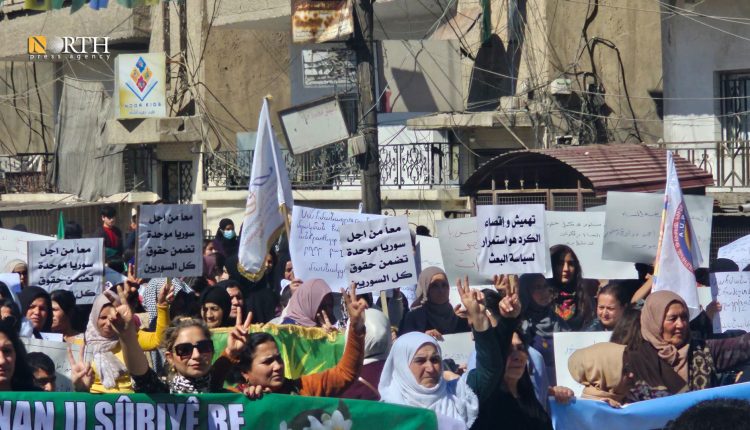Women Protest in Syria’s Qamishli Against Syria’s Constitutional Declaration
By Kardo Roj
QAMISHLI, Syria (North Press) – Dozens of women gathered in Qamishli, northeast Syria, on Saturday to protest against the recently announced constitutional declaration for Syria’s transitional phase, expressing concerns over the exclusion of women’s rights and the representation of diverse communities in the country’s future governance.
The protests, which took place across several cities in northeast Syria, were organized in response to calls from Syrian activists rejecting the constitutional declaration ratified on Thursday, March 13, 2025, by Ahmed al-Sharaa, Syria’s transitional president. The declaration sets a five-year transition period, but many believe it fails to ensure the representation of women and marginalized communities, particularly in the Autonomous Administration of North and East Syria (AANES).
Protesters held banners stating, “Any constitution that does not guarantee the rights of women and all communities will not be accepted.”
Ibtisam al-Hassan, spokesperson for Kongra Star—a prominent Kurdish women’s movement in northeast Syria—expressed strong opposition to the declaration. “We reject a constitution that marginalizes women and the communities of northeast Syria,” she told North Press.
She added that many Syrians had hoped for a democratic, decentralized, and pluralistic state after the fall of the Ba’athist regime. However, the new constitutional framework, instead of embracing inclusivity, has disregarded the core principles of representation for all components of Syrian society.
Abeer Hassaf, a member of the Women’s Coordination Office in the Autonomous Administration, also criticized the constitutional declaration, arguing that it ignores the demands of women in Syria.
“This declaration will only bring more violence, destruction, and further division to Syria,” Hassaf warned, emphasizing that the exclusion of diverse voices would only deepen existing political and social rifts in the country.
The constitutional declaration has sparked widespread debate across Syria. While the transitional leadership argues that it paves the way for a new political era, its critics—especially in the AANES-administered regions—believe it fails to acknowledge the realities on the ground.
The AANES and its military force, the Kurdish-led Syrian Democratic Forces (SDF), have played a key role in stabilizing the region after years of conflict with ISIS and other extremist factions. However, the lack of recognition for their governance model in the constitutional process has fueled frustration and resistance from local communities.
As the transitional period begins, tensions remain high over whether the constitutional declaration can serve as a foundation for lasting peace in Syria. Protests and political statements from the AANES leadership indicate a growing pushback against exclusionary governance frameworks.
Whether the Syrian leadership will amend the constitution to incorporate broader representation, including voices from northeast Syria, remains uncertain. However, women’s movements and civil organizations have vowed to continue advocating for their rights and ensuring their voices are heard in Syria’s political future.

